Postcard from the meeting of worlds
Old cities always make me think about the future.
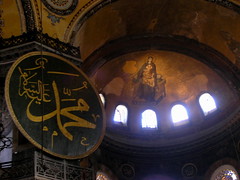 I've spent the past few days wandering around the straits of the Bosphorus with my friend James. Istanbul is a remarkable ode to the meeting of cultures: the ancient and the modern, East and West, Islam and Christianity, side by side. For centuries, Europeans built cathedrals and Jews synagogues on one side of the Golden Horn; Ottoman sultans built mosques on the other. Today the three cultures exist side by side, crescent by star by cross, as geographical a testament to the integration of the three "religions of the book" as one could wish.
I've spent the past few days wandering around the straits of the Bosphorus with my friend James. Istanbul is a remarkable ode to the meeting of cultures: the ancient and the modern, East and West, Islam and Christianity, side by side. For centuries, Europeans built cathedrals and Jews synagogues on one side of the Golden Horn; Ottoman sultans built mosques on the other. Today the three cultures exist side by side, crescent by star by cross, as geographical a testament to the integration of the three "religions of the book" as one could wish. A funny thing happened on the ferry across the Bosphorus. I thought one of the other passengers looked familiar, but I couldn't believe my eyes. A few meters away was David Hollinger, the head of the History Department at Berkeley, whom several CrossLeft fans heard a few weeks ago, when he was the keynote speaker at the conference on progressive Christianity at the National Cathedral in Washington. David was in Istanbul to give another version of the same paper on the history of pluralism, liberalism and tolerance as a project advocated by American Protestants. The Turkish State Department had flown him over to talk about what civic pluralism means for a nation, where it comes from, and how it once, civic pluralism flourished in America, directly because of the work of progressive Christians.
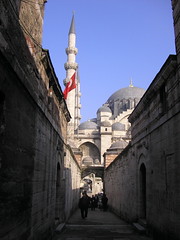 The Turkish government, intent on promoting itself as fully compatible with the European Economic Community, forcibly promotes as syncretic and pluralistic a religious community as can be seen anywhere in the world. The headscarf is banned on the grounds of promoting a culture free from the tyrannies of religion through social conformity (the ban is enforced only at schools, and insistence on the private choice of women to their own statement of belief is carried forward by the wife of Prime Minister Recep Tayyip Erdogan, who continues to wear a headscarf in public). Turkey has good reason to insist on religious pluralism, even while it negotiates room for devoted practice of religious values.
The Turkish government, intent on promoting itself as fully compatible with the European Economic Community, forcibly promotes as syncretic and pluralistic a religious community as can be seen anywhere in the world. The headscarf is banned on the grounds of promoting a culture free from the tyrannies of religion through social conformity (the ban is enforced only at schools, and insistence on the private choice of women to their own statement of belief is carried forward by the wife of Prime Minister Recep Tayyip Erdogan, who continues to wear a headscarf in public). Turkey has good reason to insist on religious pluralism, even while it negotiates room for devoted practice of religious values. Later that day, in between baklava and coffee, I pick up the Herald Tribune and Le Monde, both edited from Paris, and available on newsstands where the New York Times never makes it. Le Monde Diplomatique for December was boiling with indictment of American foreign policy. Torture has been huge in the newspapers here ever since it was released that the US has been housing Guantanamo Bay-like facilities in some Eastern European countries. The European Union has been threatening major action against any European country that houses American-style torture facilities.
Europe reassures us that morality can still exist, that intelligent discourse above the level of a Rupert Murdoch media is possible; that if we can make plans as ambitious as the American plans for a globalized economy, we can certainly plan to house our workers and inoculate them against tuberculosis and diminish our dependence on fossil fuels before oil peaks and leaves third world countries without a discernible source of food. Le Monde Diplomatique seared with rage against the orders to bomb Al-Jazeera. It used statistics and clear evidence to mock Francis Fukuyama and Samuel Huntington, Bush's neocon gurus, who have argued for militantly intolerant Christianity, anti-integration immigration politics, and government-subsidized capitalism, as if these forms of exclusion would bring peace and social stability in their wake.
(Le Monde Diplomatique, the monthly political review by the Paris newspaper Le Monde, is conveniently translated into English by Google)
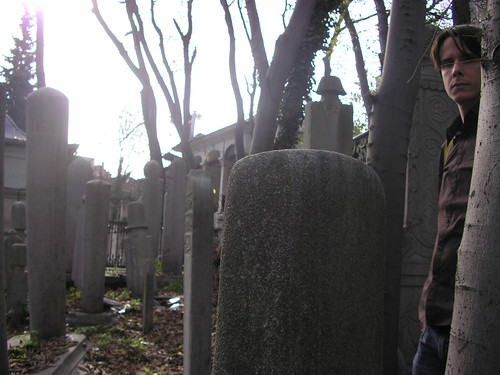 James and I wandered through the Sufi monastery where lay the bodies of dead dervishes and mystics who wrote love poetry to God. In the peace of that graveyard, amidst the olive trees and playing cats, I paused in the silence to enjoy the feeling of severe love rushing across the world.
James and I wandered through the Sufi monastery where lay the bodies of dead dervishes and mystics who wrote love poetry to God. In the peace of that graveyard, amidst the olive trees and playing cats, I paused in the silence to enjoy the feeling of severe love rushing across the world. The Fukuyamas and Huntingtons argue that our differences will always tear us apart. They are believers in differences, and their heart is so seared by faith in difference, that in their sight the world is plagued by a Lord of Difference whose realm is enormous that no culture can escape his rule. No amount of education can free us from him, no act of charity save his chosen victims.
What I sensed in the monastery was a hint of that true breeze I feel in every holy site in the world: a clarity that the bonds and rifts of the world are there for us to bind and break them; that the laws of economy and propriety and difference bend beneath the will of the law of love; that the universe and God himself are weary of the law of the Lord of Difference and back the individual who acts against it.
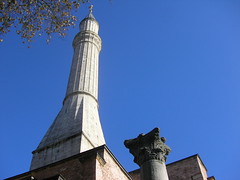 But Istanbul has other lessons besides those of the mystics. Seated under the Madonna in the Hagia Sophia, it's hard to forget that Istanbul, as Constantinople, started the idea of a Christian Empire. Augustine endorsed the empire for Christians, claiming that the church could use political power as a platform through which to transform the world. Rome enabled an empire that gave its citizens wide freedoms and a large degree of religious tolerance; Constantinople added to the freedoms of that empire the liberty of souls freed from sin. For Augustine, at least, empire could act to spread the gospel of individual liberty, of radical morality.
But Istanbul has other lessons besides those of the mystics. Seated under the Madonna in the Hagia Sophia, it's hard to forget that Istanbul, as Constantinople, started the idea of a Christian Empire. Augustine endorsed the empire for Christians, claiming that the church could use political power as a platform through which to transform the world. Rome enabled an empire that gave its citizens wide freedoms and a large degree of religious tolerance; Constantinople added to the freedoms of that empire the liberty of souls freed from sin. For Augustine, at least, empire could act to spread the gospel of individual liberty, of radical morality. As America embarks on its path to empire, restaging the Great Game in Asia for the natural gas fields of Russia and the oil fields of Kazakhstan, we have wheeled ourself into the domain of a great battle between different visions of empire.
On the one hand is the law of corporate welfare, the Law of Difference, the neocon strategy for control of the globe for the sake of control alone. The NeoCons make no great plans for morality: they simply strip the Christian religion of all its non-utilitarian elements and reduce the church to a tool for disciplining honest workers with predictable families.
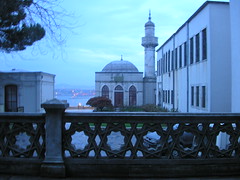 On the other hand is everything we have to learn from history, from Europe's past and from our own. French papers daily repeat the Enlightenment heritage of a morality whose foundation grows from the Judeo-Christian reverence for individual rights, but is compatible with a human family well beyond the sphere of the church. Roman ruins glows in the light of Augustine's vision of the use of empire to extend a Christian morality whose aims transcend those of the empire. The graveyards vibrate with Sufi whispers, telling us, always, every moment, to remember our our power to choose between material wealth or godly pleasure in the society of other human beings. There are the graves and ruins of empires -- Persian, Sassanid, Parthian, Greek, Roman, Byzantine, Ottoman -- reminding us of all the religions of Mammon that have come and been utterly destroyed, to remind us that we need not suffer from our empires forever.
On the other hand is everything we have to learn from history, from Europe's past and from our own. French papers daily repeat the Enlightenment heritage of a morality whose foundation grows from the Judeo-Christian reverence for individual rights, but is compatible with a human family well beyond the sphere of the church. Roman ruins glows in the light of Augustine's vision of the use of empire to extend a Christian morality whose aims transcend those of the empire. The graveyards vibrate with Sufi whispers, telling us, always, every moment, to remember our our power to choose between material wealth or godly pleasure in the society of other human beings. There are the graves and ruins of empires -- Persian, Sassanid, Parthian, Greek, Roman, Byzantine, Ottoman -- reminding us of all the religions of Mammon that have come and been utterly destroyed, to remind us that we need not suffer from our empires forever.When the Fukuyamas and Huntingtons tell us that their vision of empire is the only vision of the future in which the American economy will be safe, they wash away the greater part of what history tells us about empires.
The Neocons claim that all power has to be coercive; that all nations must defer to American corporate power; that corporate power has no room for altruism; that the character of our nation is informed by a militant Christianity which worships the persecution of anyone who deviates from a certain economic and family pattern norm.
Those who worship a Lord of Life know that the reign of the Lord of Difference is limited. They know the God of the Market who waves his hand impatiently at 3 billion malnourished worldwide, who hands the future's blueprints over to tight-lipped scientists and economists who shrug and return to their accounting tables. We have heard about another God, who came that we should have life and have it abundantly. We have all the wisdom of history to learn from, all the clearly-put statistics of European papers to argue from, every letter of the gospel to back up our mandate. We have ahead of us a long road: all the hearts of those we encounter to win, all the well-structured empires of entrenched media and tired politicians to plow down; every vote in America to fight for. But we have a great cause, far greater than the cause of Difference and income; we have every mouth in the world to feed, every life in the world to fight for; an empire to transform, and a civilization to rebuild.










0 Comments:
Post a Comment
<< Home